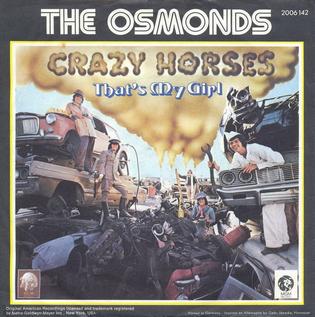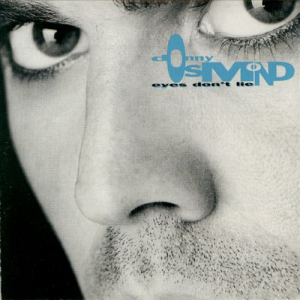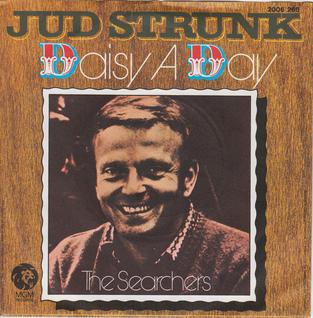
Donald Clark Osmond is an American singer, dancer, actor, television host, and former teen idol. Osmond first gained fame performing with four of his elder brothers as the Osmonds, earning several top ten hits and gold albums. Then, in the early 1970s, Osmond began a solo career, earning several additional top ten songs.

Olive Marie Osmond is an American singer, actress, author, philanthropist, talk show host and a member of the show business family the Osmonds. Although she was never part of her family's singing group, she gained success as a country and pop music artist and television variety show cohost and in the 1970s and 1980s. Her best known song is a remake of the country pop ballad "Paper Roses". From 1976 to 1979, she and her singer brother Donny Osmond hosted the television variety show Donny & Marie.

The Osmonds were an American family music group who reached the height of their fame in the early to mid-1970s. The group had its best-known configurations as a quartet and a quintet. The group has consisted of siblings who are all members of a family of musicians from Ogden, Utah and have been in the public eye since the 1960s.

Eydie Gormé was an American singer who had hits on the pop and Latin pop charts. She sang solo and in the duo Steve and Eydie with her husband, Steve Lawrence, on albums and television. She also performed on Broadway and in Las Vegas.

"Ain't Nothing Like the Real Thing" is a 1968 single released by American R&B/soul duo Marvin Gaye and Tammi Terrell, on the Tamla label in 1968. The B-side of the single is "Little Ole Boy, Little Ole Girl" from the duo's United LP. The first release off the duo's second album: You're All I Need, the song - written and produced by regular Gaye/Terrell collaborators Ashford & Simpson - became a hit within weeks of release eventually peaking at number 8 on the Billboard Hot 100 and number 1 on the Hot Soul Singles chart, the first of the duo's two number 1 R&B hits. In the UK "Ain't Nothing Like the Real Thing" reached number 34.

"Ben" is a song written by Don Black and Walter Scharf for the 1972 film of the same name. It was performed by Lee Montgomery in the film and by Michael Jackson over the closing credits. Jackson's single, recorded for the Motown label in 1972, spent one week at the top of the Billboard Hot 100, making it Jackson's first number one single in the US as a solo artist. Billboard ranked it as the number 20 song for 1972. It also reached number 1 on the ARIA Charts, spending eight weeks at the top spot. The song also later reached a peak of number 7 on the UK Singles Chart. In 2004, the song appeared in The Ultimate Collection.
"Too Young" is a popular song. The music was written by Sidney Lippman, the lyrics by Sylvia Dee. The song was published in 1951.
"Deep Purple" was the biggest hit written by pianist Peter DeRose, who broadcast, 1923 to 1939, with May Singhi as "The Sweethearts of the Air" on the NBC radio network. "Deep Purple" was published in 1933 as a piano composition. The following year, Paul Whiteman had it scored for his suave "big band" orchestra that was "making a lady out of jazz" in Whiteman's phrase. "Deep Purple" became so popular in sheet music sales that Mitchell Parish added lyrics in 1938.
"Young Love" is a popular song, written by Ric Cartey and Carole Joyner, and published in 1956. The original version was recorded by Ric Cartey with the Jiva-Tones on November 24, 1956. It was released in 1956 by Stars Records as catalog number 539 and one month later by RCA Records as catalog number 47-6751. Cartey's version never charted.

"Go Away Little Girl" is a popular song written by Gerry Goffin and Carole King. It was first recorded by Bobby Vee for Liberty Records on March 28, 1962. The lyrics consist of a young man asking a young attractive woman to stay away from him, so that he will not be tempted to betray his steady girlfriend by kissing her. The song is notable for making the American Top 20 three times: for Steve Lawrence in 1963, for The Happenings in 1966, and for Donny Osmond in 1971. It is also the first song, and one of only nine, to reach US number 1 by two different artists.

"The Other Side of Me" is a pop song written by Neil Sedaka and Howard Greenfield. Sedaka's version of the song was released on his 1973 UK album The Tra-La Days Are Over. Donny Osmond also released an album version of the song in 1973, on Alone Together, and it was the title track of Vince Hill's 1973 LP.

"I'm Leaving It Up to You" is a song written by and originally performed by Don Harris and Dewey Terry in 1957. It was later popularized in 1963 by the American duo Dale and Grace, who took it to #1 on the Billboard Hot 100 chart. In 1974, Donny and Marie Osmond reached the top five on the US Hot 100 chart and peaked at #1 on the Billboard Hot Adult Contemporary chart with their cover.

The discography of American country pop singer Marie Osmond contains 12 studio albums, three compilation albums, one soundtrack album, one video album, six music videos, 33 singles and 2 album appearances. She first gained exposure on television with her siblings' group, The Osmonds. She then signed her own recording contract with MGM Records. Osmond specifically chose to be marketed towards the country field. In 1973, she released her debut single, "Paper Roses." The song reached number one on the Billboard Hot Country Songs chart and crossed into the top five of the Billboard Hot 100. Her debut studio album of the same name also topped Billboard's country albums chart and spent 20 weeks on the survey. It was also her highest charting album on the Billboard 200 all-genre chart, climbing to number 59. She followed this with 1974's "In My Little Corner of the World" and 1975's "Who's Sorry Now." Both singles reached the top 40 of the Billboard country songs chart. In addition, she released two more studio albums with MGM during this period. She then began a duet career with her brother during the latter half of the 1970s. However, in 1977 she recorded a solo album of pop music entitled This Is the Way That I Feel.

"Crazy Horses" is a 1972 hit single by The Osmonds, the title track from the album of the same name. The song, the only hit record from the Osmonds to feature Jay Osmond as lead vocalist, reached number 14 on the US Billboard Hot 100 and number 2 in the UK Singles Chart. The song has since been covered by numerous other performers.
"Cabaret" is the title song of the 1966 musical of the same name, sung by the character Sally Bowles. It was composed by John Kander, with lyrics by Fred Ebb.

Eyes Don't Lie is a full-length album by Donny Osmond, his eleventh solo studio album. Released on 30 October 1990 on the Capitol label, it peaked at 177 on the Billboard 200 album chart.

"Let Me In" is a song written by Alan Osmond, Merrill Osmond, and Wayne Osmond and performed by The Osmonds. It was featured on their 1973 album, The Plan. The song was produced by Alan Osmond.

"Daisy a Day" is a song written and performed by Jud Strunk. The song was produced by Mike Curb and Don Costa. Costa also arranged the song.
The World of Steve & Eydie is a 1972 album released by Steve Lawrence and Eydie Gorme where they sing songs in multiple languages.

The discography of American pop duo Donny and Marie Osmond contains seven studio albums, four compilation albums, one soundtrack album, one live album and 12 singles. Both siblings had previously had successful solo music careers before first collaborating in 1974; Donny was also a member of his brothers' band, The Osmonds. Their first single, "I'm Leaving It Up to You," reached number four on the Billboard Hot 100. Their corresponding debut album of the same name peaked at number 35 on the Billboard 200 chart in November 1974. The release certified gold in the United States for sales beyond 500,000 copies. Together, the duo had two more hits that reached both the top ten and 20 of the Hot 100: "Deep Purple" and "Morning Side of the Mountain."















